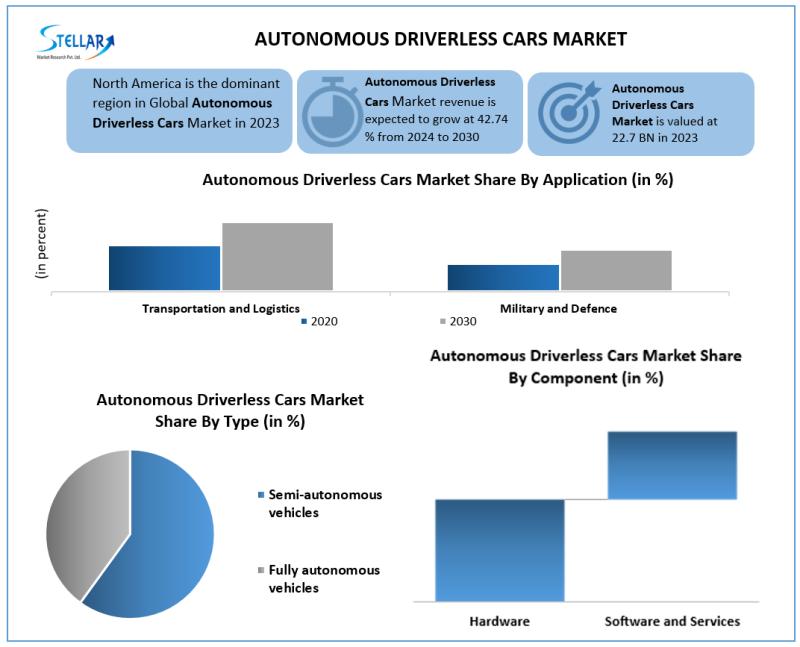
Future of Transportation: Autonomous Cars Market to Hit $104 Billion
The world of transportation is undergoing a seismic shift. Autonomous cars, once a concept found only in science fiction, are rapidly becoming a tangible reality. According to a recent market analysis, the autonomous driverless cars market is projected to reach a staggering $104 billion by the year 2030. This growth promises not only to transform how we get from A to B but also to redefine industries and cultures across the globe.
The Rise of Autonomous Vehicles
Technological advancements in artificial intelligence, machine learning, and sensor systems have enabled the swift development of autonomous vehicle technology. Companies like Tesla, Waymo, and Uber are leading the charge, investing heavily in research and development to make driverless cars a viable solution.
From reduced traffic congestion to enhanced fuel efficiency and minimized human error, autonomous vehicles come with numerous promises. In particular, the reduction of road accidents due to human error could save countless lives annually, providing a powerful incentive for their development.
Economic Impact of the Autonomous Car Market
The anticipated explosion in the autonomous car market is set to have significant economic ramifications. Not only will it create a multi-billion-dollar industry in its own right, but it will also foster growth in related sectors.
The Impact on the Job Market
Despite concerns about job displacement, particularly for drivers, the rise of autonomous vehicles is also expected to generate new employment opportunities. These include roles in vehicle maintenance, software development, cybersecurity, and urban planning. As the industry evolves, so will its labor needs, leading to a dynamic shift in the workforce landscape.
Environmental Advantages of Driverless Cars
The environmental benefits of autonomous cars represent another compelling aspect of their appeal. As most driverless cars are expected to be electric, their widespread adoption could significantly reduce greenhouse gas emissions.
Efficient Energy Use
Autonomous vehicles can be programmed for optimized driving patterns, reducing energy consumption and promoting efficient fuel use. This efficiency translates into fewer emissions, contributing to cleaner urban air environments and helping combat climate change.
Urban Planning and Reduced Traffic
Moreover, autonomous cars have the potential to revolutionize urban planning. By optimizing traffic flow and reducing the need for extensive parking infrastructures, these vehicles can contribute to more sustainable and livable urban environments.
Challenges Facing Autonomous Cars
While the potential of autonomous cars is immense, several hurdles remain. Adoption rates will depend heavily on public trust, regulatory frameworks, and technological reliability.
Public Perception and Safety Concerns
Public perception is one of the largest barriers to widespread adoption. Many individuals remain skeptical about the safety and reliability of driverless vehicles. Building public trust will require extensive testing, as well as the demonstration of a robust safety record.
Legal and Ethical Considerations
In addition, the legal and ethical implications of autonomous transportation systems are still under discussion. Questions regarding liability in the event of accidents and issues surrounding data privacy will need to be addressed as these vehicles become more common on our roads.
Technological Innovations Driving the Market
Technological innovations are the backbone of the autonomous vehicles market. Breakthroughs in areas such as lidar (Light Detection and Ranging), machine learning algorithms, and connectivity technologies are crucial to the functioning of driverless cars.
Lidar and Sensor Technologies
Lidar systems allow autonomous vehicles to perceive their environment in detail, creating 3D maps that help in navigation and obstacle detection. Companies are continuously refining these systems to ensure precision and reliability.
Artificial Intelligence and Decision-Making
Machine learning and AI are central to enabling cars to make decisions in real-time. By processing vast amounts of data, these systems can learn from their environment, potentially improving their performance with experience.
Looking Forward: The Future Landscape
As the autonomous car industry moves towards maturity, its influence will likely extend beyond simple transportation. The implications for society as a whole are profound, with the potential to redefine personal and commercial transport.
Integration with Smart Cities
Autonomous vehicles are expected to integrate seamlessly with the broader trend of smart city development. With the Internet of Things (IoT) and advanced communication networks, these cars will be part of a hyper-connected city infrastructure.
Shift in Consumer Behavior
As ownership models shift towards shared and subscription-based services, consumer behavior in terms of vehicle ownership could dramatically change. Urban inhabitants might prioritize convenience and shared use over individual car ownership.
Conclusion: A Transformative Era
The path towards a $104 billion autonomous car market by 2030 indicates a transformative phase for global transportation. While challenges remain, the envisioned benefits of economic gains, enhanced safety, and environmental sustainability present a compelling case for continued development and adoption.
As companies and governments strive to navigate these new waters, the world stands on the brink of a transport revolution. The future of transportation beckons, promising innovations limited only by our imagination.


